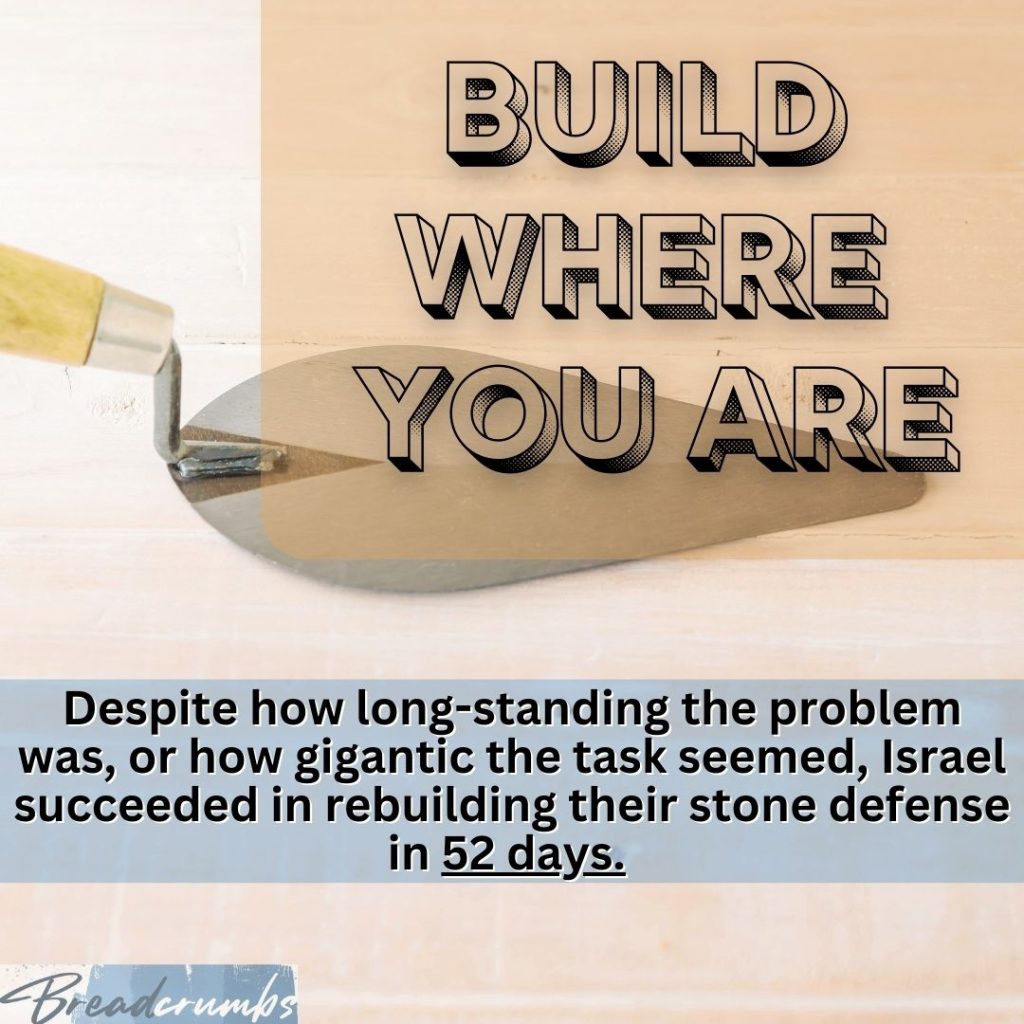
Cyrus, the king, released the people from their 70-year captivity to Babylon with his permission and a decree to rebuild the temple of God (Ezra 1:1-4). About 90 years later, Nehemiah had another king’s authority to rebuild the walls of Jerusalem. It was an enormous task. The city had been nearly a century and a half without walls. Modern estimates are that, under Nehemiah’s leadership, there were about two and a half miles of wall constructed or repaired. Despite how long-standing the problem was, or how gigantic the task seemed, Israel succeeded in rebuilding their stone defense in 52 days (Neh 6:15).
We aren’t rebuilding a wall after it was destroyed by Babylon, but what the Jews did under the leadership of Nehemiah can still help us in our service to God. Here are some concepts we can learn from their example in the monumental task. See if you can find others in the rest of the book of Nehemiah.
Talk has always been cheap. When Nehemiah rallied the people to build, they responded, “Let us rise up and build” (Neh 2:18, Unless otherwise stated: Scripture is taken from the New King James Version ®. Copyright © 1982 by Thomas Nelson, Used by permission. All rights reserved). Israel’s enemies accused them of rebellion. Nehemiah made it plain that he was not intimidated. He said, “The God of heaven Himself will prosper us; therefore we His servants will arise and build, but you have no heritage or right or memorial in Jerusalem” (Neh 2:20). What did God’s servants do? They rose up and built (Neh 3:1)! However, there were some leaders among them who “did not put their shoulders to the work of the Lord” (Neh 3:5). They might have said they would build, but their actions spoke otherwise.
We must say what we mean and mean what we say (Jas 5:7). If we say we believe in the Lord and want to live for Him, it is meaningless if we don’t act on it. Faith that does not influence the way we live is dead (Jas 2:17-20, 26).
Another thing that becomes apparent when we are busy with God’s work and not our petty concerns is the past can stay in the past. The Gibeonites helped make repairs. Though the beginning of their relationship with Israel was rough, they were a part of the rebuilding effort (Josh 9; Neh 3:7). Even if they were just woodcutters and water carriers, they had a part in rebuilding the city of the promised people (Josh 9:21).
Further, the people busy with the construction were not all men or contractors. Hallohesh’s daughters helped with the wall (Neh 3:12). Priests, goldsmiths, perfumers, and merchants put their hands to the task (Neh 1, 8, 31-32).
What can you do, using what you have, to accomplish what God wants? We must give our whole selves to Him. Success through such devotion is not based upon what we don’t have, but who we are when we are submissive to His will (2 Cor 8:12; Rom 12:1). The work He does through us, even in our weakness, accomplishes more than we could imagine. This is so all glory will be His in the end (2 Cor 12:9-10; 1 Cor 1:26-31).
No matter who you are, where you are from, or what you have done, you can determine to labor on God’s behalf from now on. Will you be a faithful servant of the Lord in word and deed? Will you use what you have in His service?
-Van

